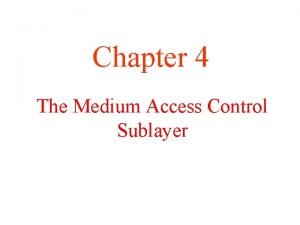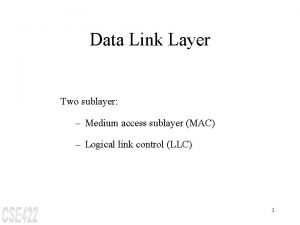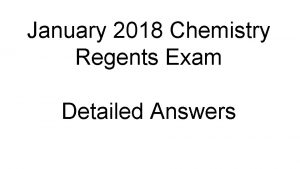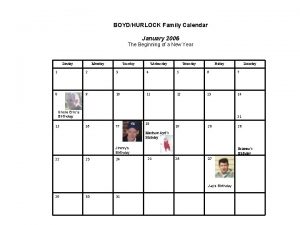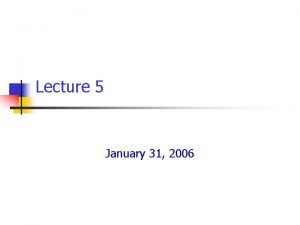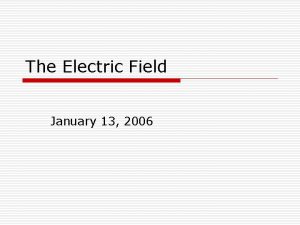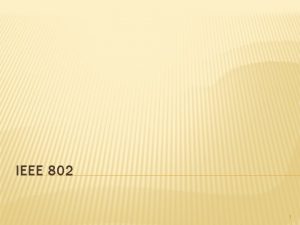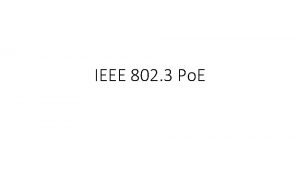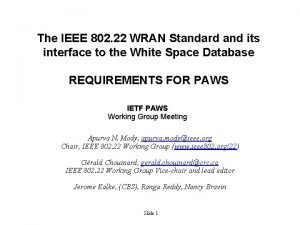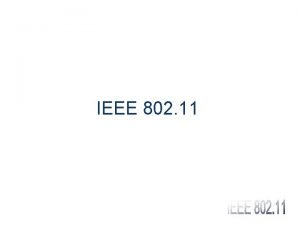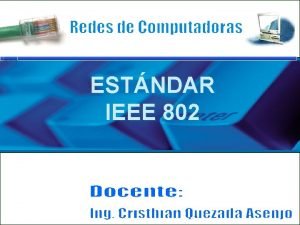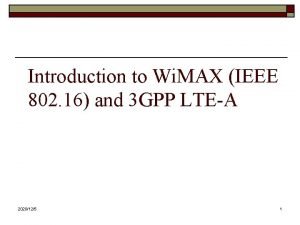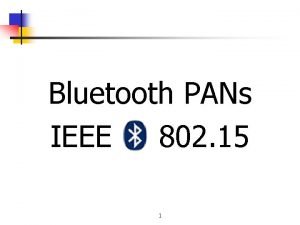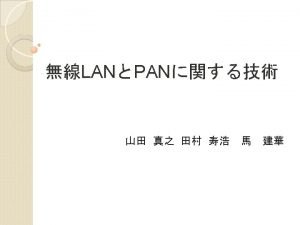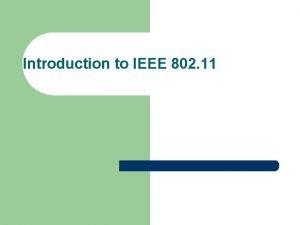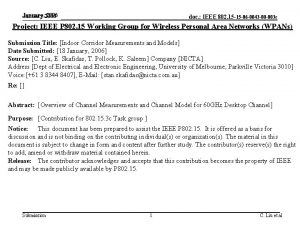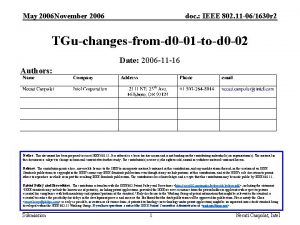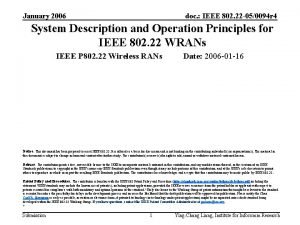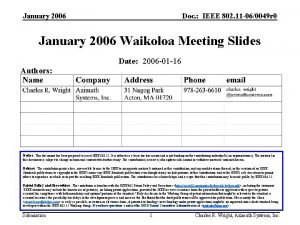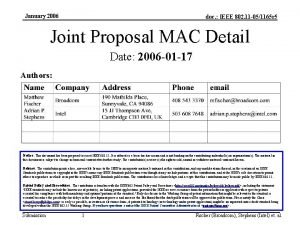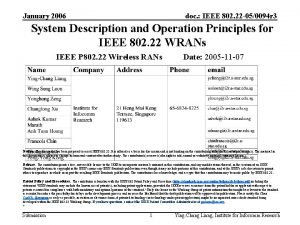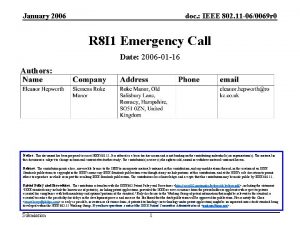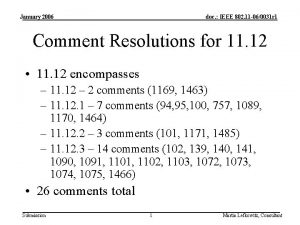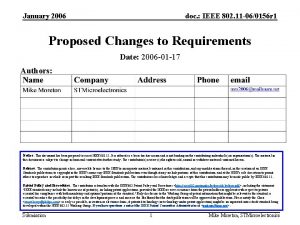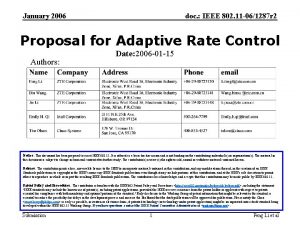January 2006 doc IEEE 802 22 060018 r















- Slides: 15

January 2006 doc. : IEEE 802. 22 -06/0018 r 1 OQAM performances and complexity IEEE P 802. 22 Wireless RANs Date: 2006 -01 -06 Authors: Notice: This document has been prepared to assist IEEE 802. 22. It is offered as a basis for discussion and is not binding on the contributing individual(s) or organization(s). The material in this document is subject to change in form and content after further study. The contributor(s) reserve(s) the right to add, amend or withdraw material contained herein. Release: The contributor grants a free, irrevocable license to the IEEE to incorporate material contained in this contribution, and any modifications thereof, in the creation of an IEEE Standards publication; to copyright in the IEEE’s name any IEEE Standards publication even though it may include portions of this contribution; and at the IEEE’s sole discretion to permit others to reproduce in whole or in part the resulting IEEE Standards publication. The contributor also acknowledges and accepts that this contribution may be made public by IEEE 802. 22. Patent Policy and Procedures: The contributor is familiar with the IEEE 802 Patent Policy and Procedures http: //standards. ieee. org/guides/bylaws/sb-bylaws. pdf including the statement "IEEE standards may include the known use of patent(s), including patent applications, provided the IEEE receives assurance from the patent holder or applicant with respect to patents essential for compliance with both mandatory and optional portions of the standard. " Early disclosure to the Working Group of patent information that might be relevant to the standard is essential to reduce the possibility for delays in the development process and increase the likelihood that the draft publication will be approved for publication. Please notify the Chair Carl R. Stevenson as early as possible, in written or electronic form, if patented technology (or technology under patent application) might be incorporated into a draft standard being developed within the IEEE 802. 22 Working Group. If you have questions, contact the IEEE Patent Committee Administrator at patcom@iee. org. > Submission 1 Patrick Pirat, France Telecom

January 2006 doc. : IEEE 802. 22 -06/0018 r 1 Simulation parameters – – Constellation : 64 Bandwidth : 7 MHZ Channel: 641 MHz Modulation • • Nb of sub-carriers: 2048 Nb of modulated sub-carriers: 1728 System frequency: 7. 68 MHz Guard interval (case of OFDM): 1/16 – Convolutional encoder • 64 states – rate ½ • G 1=171 oct, G 2=133 oct Submission 2 Patrick Pirat, France Telecom

January 2006 doc. : IEEE 802. 22 -06/0018 r 1 Profiles Submission 3 Patrick Pirat, France Telecom

January 2006 doc. : IEEE 802. 22 -06/0018 r 1 OFDM with Convolutional FEC Submission 4 Patrick Pirat, France Telecom

January 2006 doc. : IEEE 802. 22 -06/0018 r 1 OQAM with Convolutional FEC Submission 5 Patrick Pirat, France Telecom

January 2006 doc. : IEEE 802. 22 -06/0018 r 1 Convolutional OQAM vs OFDM – Gaussian Submission 6 Patrick Pirat, France Telecom

January 2006 doc. : IEEE 802. 22 -06/0018 r 1 Convolutional OQAM vs OFDM Profile A Submission 7 Patrick Pirat, France Telecom

January 2006 doc. : IEEE 802. 22 -06/0018 r 1 Convolutional OQAM vs OFDM Profile B Submission 8 Patrick Pirat, France Telecom

January 2006 doc. : IEEE 802. 22 -06/0018 r 1 Convolutional OQAM vs OFDM Profile C Submission 9 Patrick Pirat, France Telecom

January 2006 doc. : IEEE 802. 22 -06/0018 r 1 OFDM/OQAM channel estimation and equalization • Pilot symbols can be inserted in a preamble – Pilot sequence specific to OFDM/OQAM can be inserted at the beginning of the frame (preamble) • Once the channel coefficients have been recovered at pilot position equalization is performed exactly the same way as for conventional OFDM – OFDM/OQAM is designed to limit interference • With IOTA filter, quasi no ISI if max delay of the channel < 10~15% of OFDM symbol duration • Quasi no Doppler in WRAN – Channel equalization performed with 1 coefficient per sub-carrier (same as OFDM). • No additional complexity due to ISI. • No need of modification of the matched "IOTA" filter. Submission 10 Patrick Pirat, France Telecom

January 2006 doc. : IEEE 802. 22 -06/0018 r 1 OQAM/IOTA implementation Submission 11 Patrick Pirat, France Telecom

January 2006 doc. : IEEE 802. 22 -06/0018 r 1 OQAM/IOTA extra complexity wrt OFDM Modulator • IFFT speed is twice but doesn't require extra hardware. A memory and processing reduction may be envisaged since the IFFT operates real numbers. • A 8 -taps complex filter with fixed coefficient (16 bits) and 3 symbol delay line memories (6 K words of 16 bits) are used to filter the pilots sub-carriers. • A 4 -taps real filter with fixed coefficient (16 bits) and 3 symbol delay line memories (6 K words of 16 bits) are used to realize the IOTA waveform. Submission 12 Patrick Pirat, France Telecom

January 2006 doc. : IEEE 802. 22 -06/0018 r 1 OQAM/IOTA extra complexity wrt OFDM Demodulator • IFFT speed is twice but doesn't require extra hardware. • A 8 -taps complex filter with fixed coefficient (16 bits) and 3 symbol delay line memories (6 K words of 16 bits) are used to filter the pilots sub-carriers. • A 4 -taps real filter with fixed coefficient (16 bits) and 3 symbol delay line memories (6 K words of 16 bits) are used to remove the IOTA wavform. • Channel estimation and equalisation are identical to OFDM. Submission 13 Patrick Pirat, France Telecom

January 2006 doc. : IEEE 802. 22 -06/0018 r 1 Q&A (1) • Should the number of symbols used by the polyphase filter be 5 so that the pulse shaping is symmetrical around the IOTA curve? – No, the number of taps is 4. • Does this mean that the transmission channel will need to be time-invariant over this number of symbols? – No. Channel estimation mechanism is implemented as for OFDM. • The system is to be designed primarily for fixed operation! – No. The good frequency localisation of IOTA is favorable to mobile applications. Refer to IEEE paper « OFDM with guard interval vs OFDM/OQAM for high data-rate UMTS downlink transmission » - D. Lacroix and al. Submission 14 Patrick Pirat, France Telecom

January 2006 doc. : IEEE 802. 22 -06/0018 r 1 Q&A (2) • Is there a way to include the cyclic prefix when IOTA is used? – Yes, but not useful and complexify the system. Submission 15 Patrick Pirat, France Telecom
